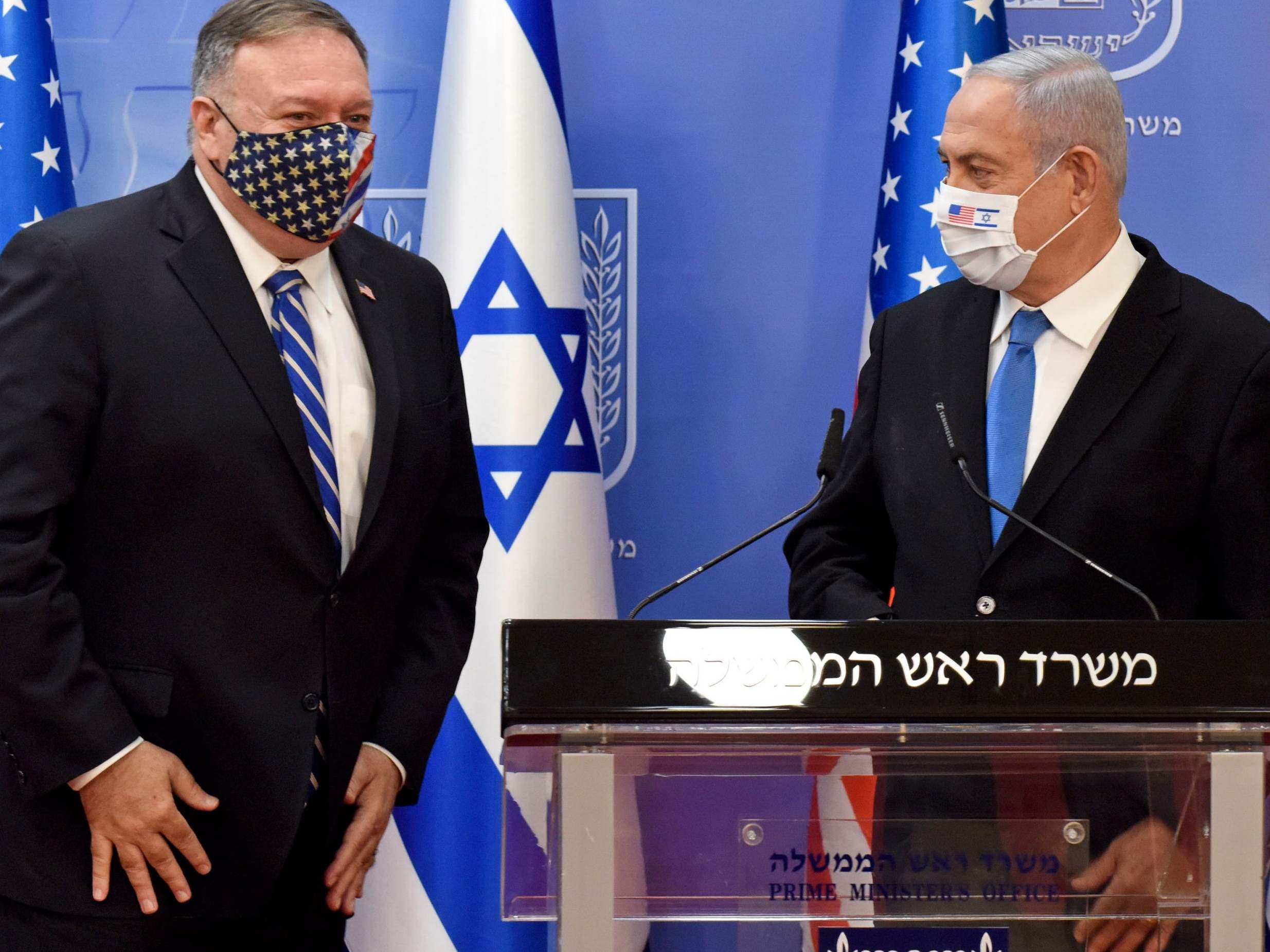Why the UAE-Israel deal may fail to kick-start peace process across Middle East
Analysis: An agreement hailed as historic has not quite had the rejuvenating effect many thought it might have

Both Dominic Raab and the US secretary of state, Mike Pompeo, presumably hoped whistle-stop tours of the Middle East and North Africa right now might allow them to leverage energy around the UAE’s historic but divisive decision to become the first Gulf state, and only the third Arab state in the world, to recognise Israel.
Briefly crossing paths in Jerusalem, the two political leaders had thought the deal might jump-start long-dead peace talks between the Israelis and Palestinians. And for Mr Pompeo at least (who is travelling to Sudan, Bahrain, the UAE and Oman) it might offer an opportunity to encourage other countries in the region to follow suit.
The UAE agreeing to have diplomatic relations with Israel is tentatively predicated on the notion that Israel suspends its controversial plan to unilaterally annex swathes of occupied Palestinian land, an action that is illegal under international law and seen by much of the international community as a huge obstacle to peace.
The Emirati leadership heralded its decision as one of the boldest steps yet towards guaranteeing the widely accepted two-state solution to the decades-old conflict.
That said, Emirati ministers have admitted to The Independent they have no guarantees that Israeli prime minister Benjamin Netanyahu might not push ahead with annexation anyway, and they wouldn’t automatically cut ties if he were to renege on his promise. The Israeli premier had been quick to assure his support base he had not shelved his annexation plans forever, stoking concern.
Therefore, so far, the UAE-Israel deal has not quite had the rejuvenating effect many thought it might have. And not just because the Palestinian leadership had roundly rejected it as a “betrayal” or a “stab in the back”.
Sudan’s government fired its foreign ministry spokesman last week after he called the UAE decision a “brave and bold step”. On Tuesday Sudanese prime minister Abdalla Hamdok diplomatically told Mr Pompeo during meetings in Khartoum, that his caretaker interim cabinet did not have the mandate to build diplomatic relations with Israel, which is a very controversial subject.
After meetings between the Palestinian leadership and Mr Raab there seemed no movement towards either warming to the UAE-Israel deal, or the idea of reigniting peace talks with the Israelis either.
Mr Pompeo, meanwhile, only met the Israeli leadership.
Domestically the agreement has faced criticism and there has been friction between the main players.
While there has been little opposition within the Emirati general public (where dissent is not encouraged), a planned Friday trilateral meeting between the US, Israel and the UAE was, according to US news outlet Axios, cancelled by the Emiratis angered by Mr Netanyahu's opposition to the US selling advanced F-35 warplanes to Abu Dhabi.
Meanwhile in Israel, the country's hard right settlers have been up in arms of the notion annexation would be postponed. David Elhayani, head of the Yesha council of setters, accused Netanyahu of having “decided half a million residents in the area and hundreds of thousands of votes”.
It has concerned the Israeli left as well for different reasons. Left-leaning newspaper Haaretz published a series of opinion pieces picking holes in the agreement including one which argued it was a considerable loss for the Palestinians and more about PR than peace.
Elizabeth Tsurkov, a fellow in the Middle East Program at the Foreign Policy Research Institute, meanwhile argued in The Conversationalist it only vindicated the Israeli right’s “long-held narrative” that if Israel maintained its military strength and refused to compromise, “the international community and the Arab world would ultimately accept Israel on its own terms.”
That said Mr Pompeo’s tour is not at an end. He may have better luck in Bahrain, which agreed last year to host both Israeli and Arab delegations for the launch of part of Donald Trump’s peace plan for the region.
Join our commenting forum
Join thought-provoking conversations, follow other Independent readers and see their replies
Comments